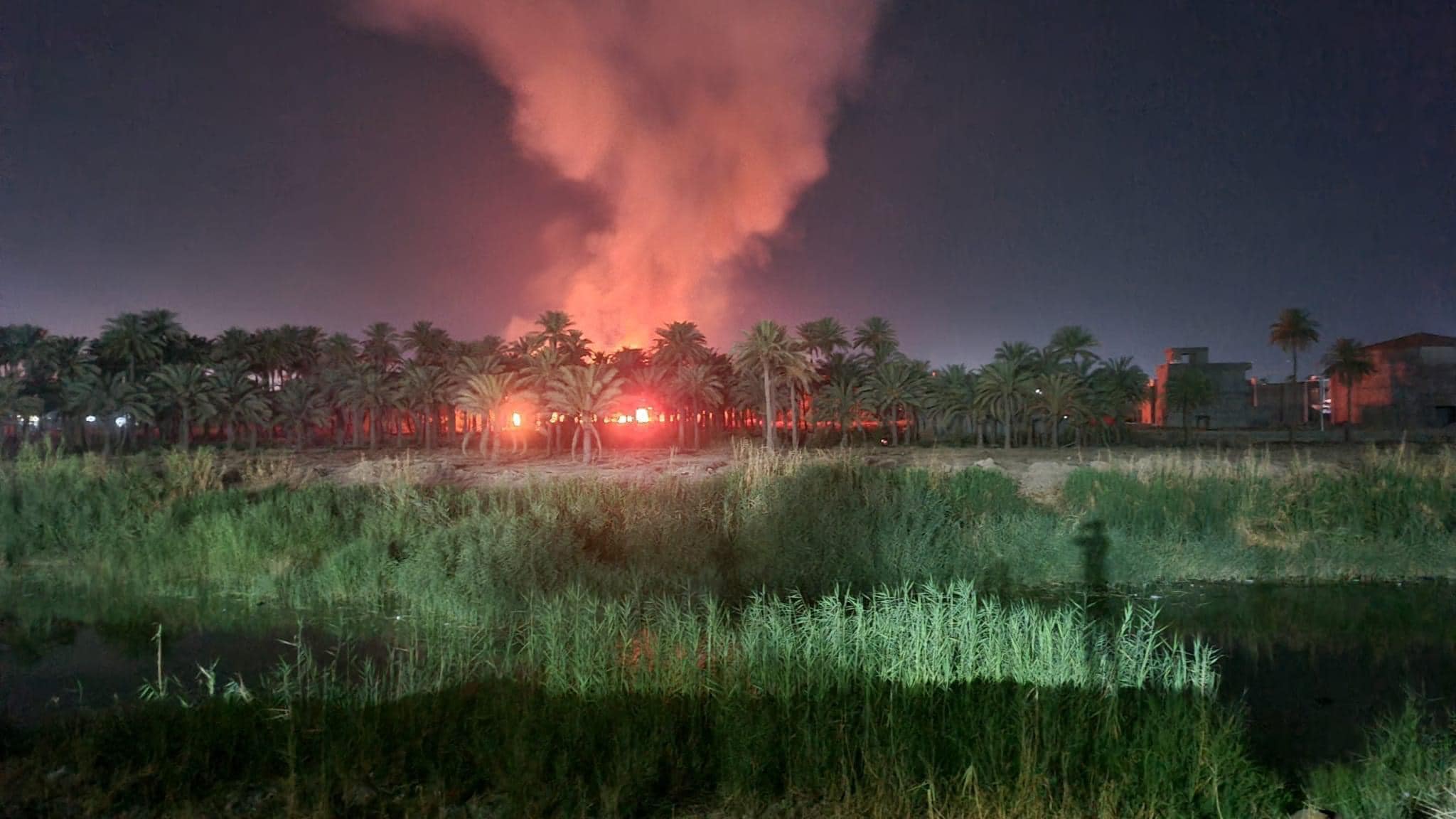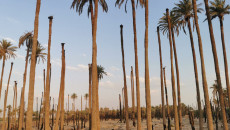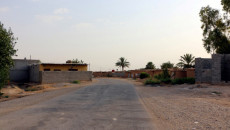During this year, 200 fire accidents were recorded in Khanaqin district, northeast of Baghdad, 12 of which were in palm orchards, causing damage of hundreds of palm trees.
The latest incident occurred last Wednesday, September 6, and resulted in the burning of an area of 10 donums (four acres) of palm groves.
The local authorities have not revealed the reason behind these fires in the palm trees up to the present.
“In the evening, I went to our orchard and saw a large fire had broken out in my orchard and one of the adjacent orchards. We tried with a number of farmers to put out the fire but in vain before the civil defense teams arrived,” Hawar Abbas, a farmer in Khanaqin, told KirkukNow.
Abbas is married and his family’s livelihood depends on the orchard. “We have no enmity with anyone and we do not know what caused the fire that caused 10 dunams of our orchards to burn. The fire consumed many palm trees, but we do not know their exact number.”
He fears a repeat of the fire incident. “I appeal to that person, whoever he is, to stop burning our orchards. What is the fault of these orchards to face such a destiny?”
According to KirkukNow's observations, the results of the investigation into the incident were not revealed and no one was charged.
In August 2021, KirkukNow published a report on the issue of bulldozing palm groves in Khanaqin, in which it stated, “Dozens of farmers in Khanaqin uproot and burn palm trees in order to convert them into residential plots and sell them for larger amounts, without referring to the government and with the support of influential people, at a time government offices in town affirmed that the rule of law is to be enforced by the higher authorities in order to put an end to these abuses.
Khanaqin District, home to 90,000 Kurds, Arabs and Turkmens, Sunnis and Shias, is part of Diyala province and is one of the disputed territories which extends from Khanaqin, on the border with Iran, to the northern oil-rich city of Kirkuk up to Shingal (Sinjar), home to the Ezidi community, in Mosul, in the far west, on Iraq-Syria borders.
Jabbar Juma, director of the Civil Defense in Khanaqin, told Kirkuk Now, “The fire occurred within the borders of the Garmaser Brigade One, near the Bawa Mahmoud checkpoint, an area where palm groves abound. Our teams arrived immediately... but due to the magnitude of the fire we asked the civil defense in Kalar for help, and they sent a fire truck, and the fire was brought under control.”
According to Civil Defense statistics, the fire resulted in the burning of 10 donums of agricultural land, including 50 palm trees.
Last August 26, a fire broke out in another palm grove in Khanaqin, causing dozens of palm trees to burn.
Beside palm trees, Khanaqin is home to many farms of citrus such as orange, lemon, and other types of fruit but none was excluded from the process of deliberate drying, cutting out and burning.
Statistics obtained by KirkukNow from the Khanaqin Agriculture Department indicate that there are 2,254 dunums of officially registered orchards in the district, most of which are palm groves, in addition to 160 dunums of land registered in the form of contracts.
“This year recorded the largest number of fires, and larger areas of orchards in Khanaqin burned compared to previous years. We sent our teams to extinguish fires about 200 times. On some days, our teams had five sorties. 12 fire incidents occurred in palm orchards,” according to Khanaqin Civil Defense Director.
Ibrahim Khalil, director of Khanaqin Agriculture, told KirkukNow that the recent fires consumed approximately 30,000 to 40,000 donums of agricultural land. “They were only palm groves, according to our information. This is the third time fires have broken out in palm groves this year.”
Agriculture and Civil Defense confirm their ignorance of the identity of those responsible for the orchard fires.
The Director of Civil Defense says, “When a large fire occurs in the orchards, we are unable to control and extinguish it because we do not have our own water wells to supply enough water to extinguish the fire.”
“We are forced to contact the water station or departments that have wells to provide us with a water tanker before heading to the fire site.”







